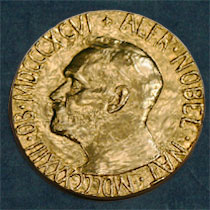This Day in World History
December 10, 1896
Alfred Nobel dies
 Stricken by a cerebral hemorrhage, wealthy industrialist Alfred Nobel died on December 10, 1896. That date is still commemorated as the day on which the famous prizes issued in his name—perhaps the most prestigious prizes in the world—are officially awarded each year.
Stricken by a cerebral hemorrhage, wealthy industrialist Alfred Nobel died on December 10, 1896. That date is still commemorated as the day on which the famous prizes issued in his name—perhaps the most prestigious prizes in the world—are officially awarded each year.
In his thirties, Swedish chemist and engineer Alfred Nobel became interested in explosives and experimented with a chemical named nitroglycerin, but it was very volatile, and accidental explosions frequently occurred. When he accidentally discovered that the liquid was more stable if dried, he had a new invention, which he called dynamite, from which he built a huge fortune. Nobel lived a solitary life: he never married and had little social life, though he was intellectually active and committed to philanthropic causes. In 1895, at sixty-two, he began to develop chest pains. Late in that year, he wrote a will. When he died the following year, his family was shocked to learn that in this will he had left the bulk of his fortune to fund prizes to be given each year to individuals who had made the greatest achievements in chemistry, literature, physiology or medicine, physics, and who had made significant contributions to world peace.
Because his surviving family contested the will, the first Nobel Prizes were not issued until 1901. In 1968, the Bank of Sweden created a sixth award, in economics, named in Alfred Nobel’s honor. The winners of the six awards—called laureates—receive medals and a citation at an awards ceremony each December 10; they also receive a sum of money. All prizes but the peace prize are awarded in Stockholm; that ceremony occurs in Oslo, as a Norwegian committee confers that award. Each laureate gives a lecture in the days preceding the awards ceremony. Some years, more than one person receives a given award. In some years, a prize in a particular field may not be granted.
“This Day in World History” is brought to you by USA Higher Education.
You can subscribe to these posts via RSS or receive them by email.



